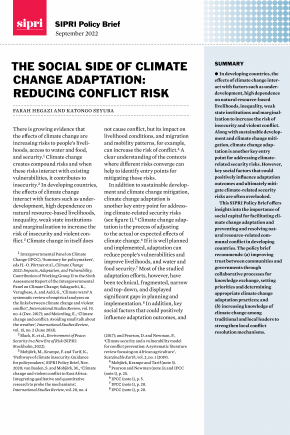The Social Side of Climate Change Adaptation: Reducing Conflict Risk
In developing countries, the effects of climate change interact with factors such as underdevelopment, high dependence on natural resource-based livelihoods, inequality, weak state institutions and marginalization to increase the risk of insecurity and violent conflict. Along with sustainable development and climate change mitigation, climate change adaptation is another key entry point for addressing climate-related security risks. However, key social factors that could positively influence adaptation outcomes and ultimately mitigate climate-related security risks are often overlooked.
This SIPRI Policy Brief offers insights into the importance of social capital for facilitating climate change adaptation and preventing and resolving natural resource-related communal conflict in developing countries. The policy brief recommends: (a) improving trust between communities and governments through collaborative processes for knowledge exchange, setting priorities and determining appropriate climate change adaptation practices; and (b) increasing knowledge of climate change among traditional and local leaders to strengthen local conflict resolution mechanisms.


